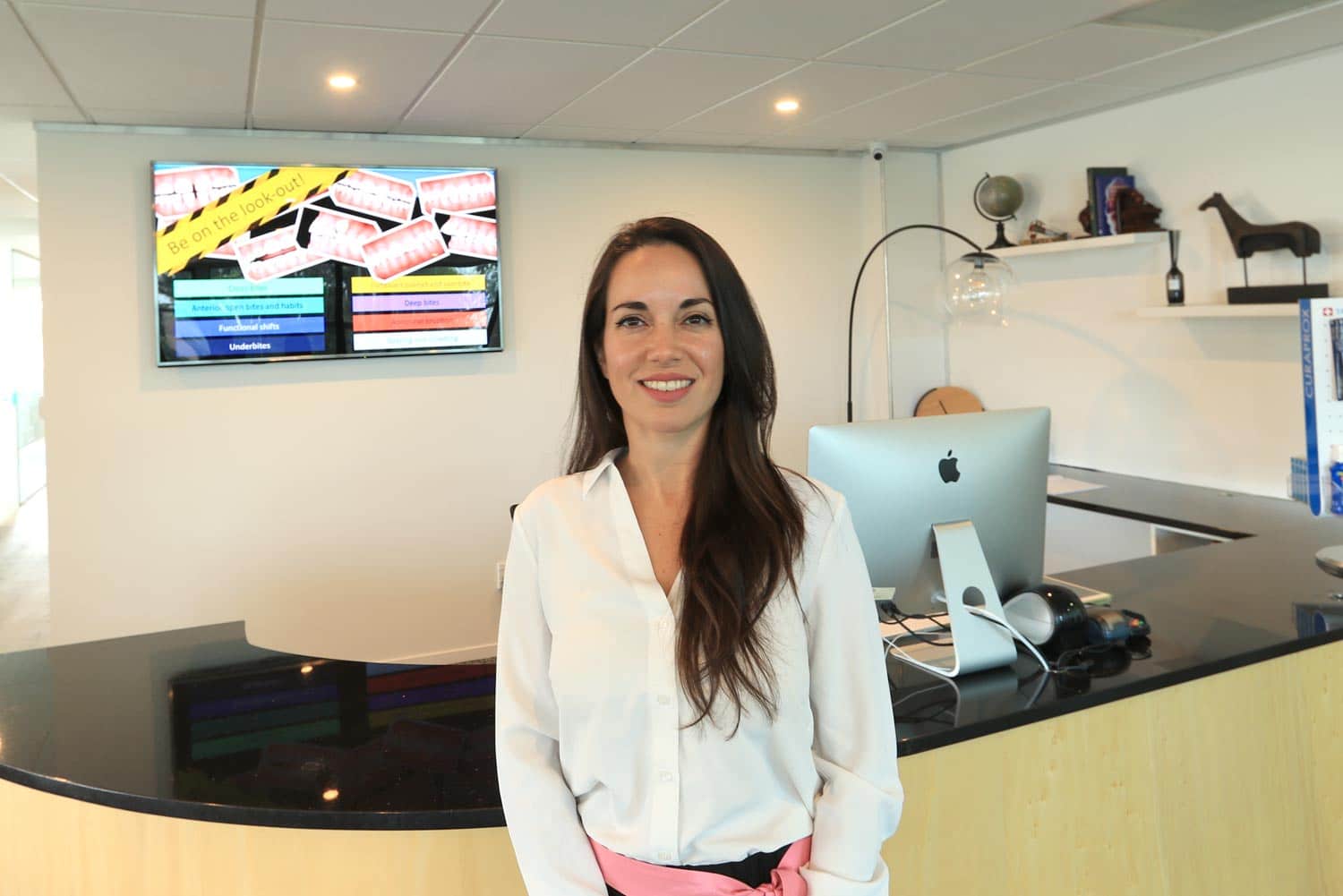
Plates are removable appliances that can be taken in and out. They are very versatile and can be used for a large number of alignment and bite problems and can be offered for our younger patients. They work fantastically well for certain situations and cost a fraction of the price that braces do. Sometimes, using plates when a child is younger, can avoid braces later in life…saving you and your family significant costs. Other times, it can lessen the severity of future treatment required.
We understand that orthodontic treatment can be carried out in many ways, and that’s why we love what we do so much! So, if we can correct bite and jaw problems with plates alone, with braces/aligners or a combination, we will make sure to give you all the options available for your case.
Removable Retention Plates
Designed to maintain the final position of teeth after active treatment.
Active Plates
These feature springs or screws to gently shift teeth in targeted areas (e.g., rotating a single tooth).
Habit-Breaking Plates
Used to discourage thumb-sucking or tongue-thrusting, promoting healthier oral habits in young patients.
After Braces – Plates help retain your smile and prevent relapse once fixed braces come off.
Minor Corrections – Ideal for small tooth adjustments without the need for full braces.
Habit Control – In children, they can manage oral habits that negatively impact bite and alignment.
For many patients, plates are one stage in a broader orthodontic journey. Here’s how they interact with braces:
🧭 Pre-Braces Adjustment: Active plates can prepare specific teeth for an easier, faster braces phase.
🔒 Post-Braces Retention: After your braces are removed, a retention plate helps lock in your results.
Our patients often begin with plates to address minor tooth movements or habits, and then transition to fixed appliances for more comprehensive alignment. For more advanced tooth alignment and bite correction, explore our range of Braces options—designed to work seamlessly after plate treatments.
Custom Fabrication
Plates are tailor-made to your mouth using models or scans for a precise fit.
Usage Instructions
We’ll advise how often to wear your plate—typically overnight or as prescribed.
Follow-Up Visits
Regular appointments ensure the plate works effectively and remains comfortable.
Integration with Braces
If a full correction is needed, we seamlessly transition from your plate to braces, ensuring continuity in your treatment plan.
Looking to fine-tune a small area without full braces?
Recently finished braces and want stable results?
Need help with oral habits that could affect your bite?
If any of these apply, a customised plate may be your best first step. And when more alignment is needed, our expert orthodontists can fit you with Braces to achieve your ideal smile.
Book a free assessment to see if an active or retention plate fits your needs.
Planning for full alignment? Ask about how plates and braces work together for optimal results.
Continue to our Braces page for detailed info on fixed appliance options.
Our expert orthodontists in Auckland design integrated treatment plans using plates and braces for smooth transitions and long-lasting smiles—no gaps left behind.
Call us on 09 2166 888 or Book Now to see how plates can be your stepping stone to a perfect, lasting smile.
Your orthodontist will instruct you in the wear of your plate(s). Follow the instructions carefully to make sure your treatment progresses as smoothly as possible. Removable plates are designed to be worn full-time for a period of time that will be recommended by your orthodontist. They should be removed when brushing teeth, eating, drinking and playing contact sports or swimming. You will be reviewed every 8-12 weeks during the period of your treatment. Always bring your plates(s) to your appointments. It is vital to attend these appointments to ensure that the fit is good and that treatment is going according to plan.
If you are having problems with the fit of your plate(s), contact the surgery as soon as possible – do not wait until your next appointment.
Clean your plate(s) at least twice a day with either soap and water or a toothbrush, without toothpaste.
Toothpaste should not be used as this is abrasive and can affect the appearance of the retainers. They can be soaked in white vinegar to eliminate odours and discolouration. Avoid using hot or boiling water when cleaning the plates, as this may distort their fit.
When placing and removing the plate(s) into and out of your mouth, use both hands – one on each side of the plate(s). Do not use your tongue to push in or take our the plate(s), as they will loosen quickly and/or break.
We advise you to purchase a box to keep your plate(s) in when they are not in your mouth. If they are wrapped in tissue or put in your pocket, they may be lost or damaged. Be extremely careful with your plate(s), because if you lose or damage them, you will be charged for their replacement.
Follow these instructions given by your orthodontist carefully and the progress of your treatment will be as planned. If you have any questions, please do not hesitate to contact the practice.
Plates are usually very comfortable (do not cause pain), but they do take a little getting used to, especially in the first few days after having them fitted. Most patients will have no issues with speech or the appearance of the plates, as they are designed to be relatively discrete discrete.
Damaged or lost plates and other appliances lengthen the overall treatment time and can add costs to treatment. Please look after your appliances to make your treatment go as smoothly as possible. Give us a call if your plate(s) is lost or damaged, and we will make arrangements to see you to organise a replacement.
Our specialist Auckland Orthodontists can assess whether plates are the right option and walk you through all available treatment paths. Book a consultation today and get expert advice from a team that truly understands how to set young smiles up for long-term success.
In 2008, Adriana graduated with a Bachelor of Dental Surgery from Santa Maria University in Caracas, Venezuela. After graduation, she worked in Venezuela in private practice, at the Orthopaedic Children’s Hospital (Dentistry/Orthodontics unit), and as a lecturer in the National Experimental University of the Armed Forces.
In the year 2011, Adriana moved to Argentina to specialise, gaining the Specialist Orthodontist degree from the University of Buenos Aires in 2013. While in Argentina, she worked as a part-time lecturer at the Orthodontics Department in the University of Buenos Aires, private practice, and at the Craniofacial Unit in the Paediatric Hospital Garrahan, looking after cleft lip new-born, children, and adolescent patients.
Adriana is a Spanish speaker. On her spare time she likes going to the beach, travelling, socialising with friends, playing video games, cooking, and going to the gym.

BDS | DClinDent | MRACDS-Orth | MOrthRCSEd
Dr Azza Al-Ani, grew up in Christchurch, is a registered specialist orthodontist working at Shakespeare Orthodontics in Auckland. You can find her at one of the clinics in the city, or at their Takapuna clinic on the North Shore.
In 2009, Azza graduated with a Bachelor of Dental Surgery with Credit from the University of Otago.
She worked as a dental house surgeon at Auckland, Greenlane and Middlemore Hospitals; and as a dental officer at Sydney’s Westmead Hospital.
In 2012, she completed the Royal Australasian College of Dental Surgeons (RACDS) primary examinations.
Before commencing her specialist training, she held a part-time Professional Practice Fellow position at the Faculty of Dentistry, while working as a dentist in private practice.
In 2016, Azza graduated from the University of Otago with a Doctor of Clinical Dentistry in Orthodontics. She passed examinations to gain memberships into the Royal Australasian College of Dental Surgeons and the Royal College of Surgeons of Edinburgh.
She is also certified with the Australasian Orthodontic Board, and is a member of the New Zealand Association of Orthodontists, and the New Zealand Dental Association.
Azza’s area of research interest is hypodontia.
She has presented about this topic at the European Orthodontic Society Congress, and at the International Association Dental Research ANZ Scientific Meeting, and has been involved in the publication of numerous articles in peer-reviewed journals.
Outside of work, Azza loves spending time with her son and Mo (her husband), socialising with family and friends, overseas travel, and tries to keep up with Mo mountain biking.

Mo is a Specialist Orthodontist. He grew up in both New Zealand and Australia.
After completing a year in Health Sciences, and later physiotherapy, he qualified as a dentist in New Zealand. He spent the next four years working alongside his father in Sydney where he practised general dentistry. Mo then returned to Dunedin to specialise, gaining his specialist degree – Clinical Doctorate in Orthodontics from the University of Otago.
During the three years of specialist training, Mo had the privilege of learning from the best. The combined clinical and academic acumen of professors, doctors and staff provided an invaluable experience.
Meanwhile, Mo published and presented significant research and clinical cases at both national and international forums, including the International Association of Dental Research, the Australasian Begg Society of Orthodontics, the European Orthodontic Society and the New Zealand Dental Association conference.
A firm believer in maintaining high clinical standards, Mo successfully completed further examinations to become affiliated with the Royal College of Surgeons (Edinburgh) and the Royal Australasian College of Dental Surgeons (Sydney).
Mo is currently a part time senior lecturer at Auckland University of Technology, a Fellow of the World Federation of Orthodontists and also holds professional memberships with the New Zealand Association of Orthodontists, the New Zealand Dental Association and American Association of Orthodontists.
He has also been involved in the supervising and lecturing of students at the Auckland University of Technology.
Outside of work, Mo enjoys the precious time with his young family and the outdoors. He especially loves mountain biking, running, fishing, diving and, in winter, snowboarding.
Traveling along with his best friend and wife (Azza) around the world has also been a big part of Mo’s life. Mo is primarily based in Shakespeare Orthodontic’s city clinics and on the North Shore.
